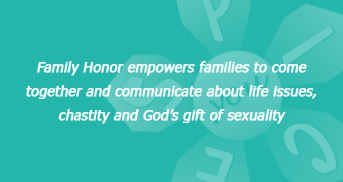|
|
|
By Susan Stith, Diocese of Altoona-Johnstown
Ritualizing ways of approaching another for forgiveness can make the process easier to begin. A sign that you're ready to talk or apologize could be a note on the other's bed pillow, fridge, bathroom mirror or in a lunch box. Or it might be a symbol such as a small stuffed bird or a heart cut out of red paper or felt; or a gesture such as a hug from behind, a hand on the shoulder. The richness and depth of the ritual grows with its use.
- Using a special area of the house to talk over the hurts and make up helps too! It could be the dining room table, two comfy chairs on the porch, the garden, etc. Young children could put one hand on a table designated as the "peace table" or roll out and sit on a special throw rug known as "peace carpet." Having a special place to make peace provides a conducive atmosphere for the difficult but important challenge of reconciling.
- You may also wish to go as family to receive individually the Sacrament of Reconciliation. Celebrate afterwards by stopping for ice cream or doing a fun activity together at home.
- Many ethnic groups have the tradition of parents offering a blessing to a child about to go to the Sacrament of Reconciliation. An older Slovak friend of mine remembers having to kneel before her father for his blessing before leaving to go to confession.
- Go out of one's way to perform an act of kindness for a family member of friend whom one has hurt. An example might be doing a chore for them.
- As part of healing, family members can set aside time to have fun together.
- Apologize to one's children, no matter how young, when you've acted inappropriately.
- Write a letter to one's grown child asking for forgiveness for one's limitations and mistakes as a parent. Families can make this a tradition at the time the child leaves home, marries, or turns twenty-one.
- Grown children might want to write to their parents asking forgiveness for the times they disappointed their parents. The occasion might be their own birthday, the parent's anniversary, or turning 21 or 30.
Secretariat for Family, Laity, Women & Youth
United States Conference of Catholic Bishops
3211 4th Street, N.E. , Washington, DC 20017-1194 (202) 541-3000
|




